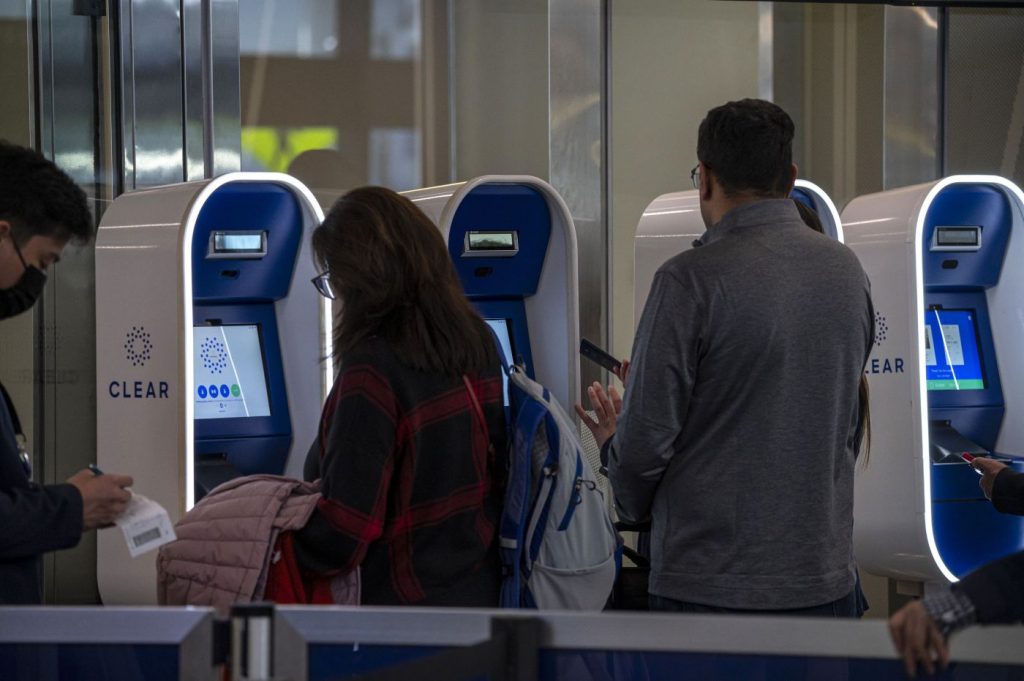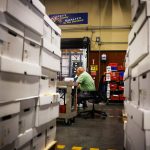The “pay-to-play” concept permeates almost every aspect of American life, including air travel.
Passengers who pay a premium for a first-class ticket board and deplane first, get bigger more comfortable seats, and are offered gourmet meals and cocktails served by flight attendants who address them by name.
But even travelers in the cheap seats are increasingly looking to dodge long security lines, paying extra to shorten their slog through airport screening, either to the Transportation Security Administration itself through its “PreCheck” service, or private companies such as CLEAR, which use biometric screening to vouch for passenger identification.
That last perk isn’t sitting so well with some California lawmakers.
A state bill would put a first-in-the-nation lid on private security screening services like CLEAR. The New York-based company operates at nine California airports, including San Jose and Oakland. Customers who pay CLEAR $189 a year get their ID verified at the terminal by a fingerprint or iris scan then get escorted to the front of the TSA line.
“Standing in line waiting for my turn to go through the TSA screening process, I became aware over time at how frustrated people would get,” said state Sen. Josh Newman, a Fullerton Democrat who introduced SB 1372. “Doesn’t everybody deserve the same fair treatment?
Newman said he travels by air at least twice a week, spending a good deal of time standing in those long lines. And it was in one of them that he watched passengers enrolled in the CLEAR program cut to the front, frustrating him and other fliers.
Newman’s bill would mandate that CLEAR and other third-party screening services operate through separate TSA lines for subscribers, eliminating the friction and frustration created by the current system and, he said, improving security.
At least a few Bay Area travelers think Newman’s got a point.
“Now that the TSA lines are so long, it is kind of annoying,” said Walnut Creek resident Angie Reposa, who travels four times a month on business and was headed out of Oakland last week for Chicago with a friend.
Breana Lee of San Francisco, also traveling out of Oakland, agreed. “It seems kind of weird to have an outside company doing this service,” Lee said.
The legislative analyst noted that the state doesn’t control the TSA or its budget for extra security staff, but added that the legislation might give CLEAR, which incorporated and became publicly traded in 2021, “strong motivation to push for more TSA funding.”
CLEAR was acquired out of bankruptcy in 2010 by Caryn Seidman-Becker, now the CEO, and Ken Cornick, the co-founder.
The bill is backed by the American Federation of Government Employees Local 1230 and the Association of Flight Attendants.
Opposed are CLEAR, several business groups including the California Chamber of Commerce and Bay Area Council, and airlines including United, Southwest, Hawaiian, Delta and Jetblue. Even the airports are in the CLEAR camp.
Sen. Roger W. Niello, a Republican representing Fair Oaks and the vice chair of the Senate Transportation Committee, said CLEAR is beneficial because there is an need for the service and the company provides jobs to scores of Californians.
He said he does not support Newman’s argument that the CLEAR screening process leads to traveler frustration.
“I don’t see that we should be cutting the CLEAR people out just because they are not convenient to us and it annoys us when those people get to go in front of the line,” he said during the committee hearing.
The legislative analyst noted in a report that airports oppose the bill because they earn fees from leasing their space to CLEAR, which reports it paid California airports a total of $13 million in 2023.
“Were airports to lose the Clear revenue they would make it up by charging other customers, such as rental car companies, other concessionaires, or airlines,” the analyst report said.
Newman, along with the bill’s flight attendant and government union backers, also questioned whether CLEAR provides adequate security.
TSA PreCheck requires a background check, fingerprints, photo identification and verified travel documents. CLEAR uses either a traveler’s eyes or their fingerprint to verify identity, replacing the need for a TSA agent to manually check a traveler’s passport or photo identification.
“Clear is not the TSA,” said Kristie Rivera, a veteran flight attendant and the president of the Association of Flight Attendants. “CLEAR does not add any enhanced layer of security to airport operations. CLEAR is just a pay-for-play way to cut the screening line.”
Gilbert Galam with the American Federation of Government Employees Local 1230 representing 1,200 TSA screening officers in Northern California, called the service a “headache” that “adds no value to security or efficiency for the traveling public.”
Galam said the line-jumping has led to fights among passengers and extra stress for security screeners.
Galam and Newman said CLEAR had two security breaches last year, including one in which a passenger carrying ammunition in his bag was led to the front of the screening line. Another flyer used a boarding pass found in the garbage to skip the line.
Related Articles
Opinion: Electric vehicles are just getting started
Fairfield: I-80 standoff ends when freeway shooting suspect shoots, injures himself
Waymo to begin testing driverless cars in Peninsula in coming weeks
Why SFO should drop San Francisco from its name
Baltimore bridge replacement will take 4 years, almost $2B
Jessica Ng, the director of state and local public affairs for CLEAR, said the breaches were caused by human error, not the biometric screening process and that the company took “swift personnel action” after the breaches were discovered.
Ng lauded the fact that CLEAR has successfully verified 167 million identities and is in operation in 56 aviation hubs nationwide.
Jim Lites with the California Airports Council said his group representing 31 commercial airports, said having a dedicated TSA officer to screen CLEAR customers in a separate line would be costly and impact revenue at California airports where the service is available.
The bill, which passed out of the Senate Transportation Committee last month, now moves to the Senate Appropriations Committee. It would need approval by the Senate and Assembly to head to Gov. Gavin Newsom’s desk.


